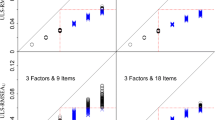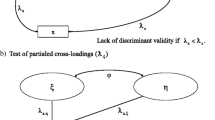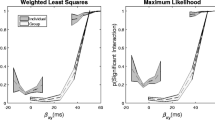Abstract
In the health and social sciences, longitudinal data have often been analyzed without taking into account the dependence between observations of the same subject. Furthermore, consideration is rarely given to the fact that longitudinal data may come from a non-normal distribution. In addition to describing the aims and types of longitudinal designs this paper presents three approaches based on generalized estimating equations that do take into account the lack of independence in data, as well as the type of distribution. These approaches are the marginal model (population-average model), the random effects model (subject-specific model), and the transition model (Markov model or auto-correlation model). Finally, these models are applied to empirical data by means of specific procedures included in SAS, namely GENMOD, MIXED, and GLIMMIX.
Similar content being viewed by others
References
Brown, H., Prescott, R.: Applied Mixed Models in Medicine (Statistics in Practice), 3rd edn. Wiley, Chichester (2015)
Bryk, A.S., Raudenbush, S.W.: Hierarchical Linear Models for Social and Behavioural Research: Applications and Data Analysis Methods. Sage, Newbury Park (1992)
Burton, P., Gurrin, L., Sly, P.: Extending the simple linear regression model to account for correlated responses. Stat. Med. 17, 1261–1291 (1998). doi:10.1002/0470023724.ch1a
Davis, C.S.: Semi-parametric and non-parametric methods for the analysis of repeated measurements, with applications to clinical trials. Stat. Med. 10, 1959–1980 (1991). doi:10.1002/sim.4780101210
Diggle, P.J., Liang, K.-Y., Zeger, A.L.: Analysis of Longitudinal Data. Oxford University Press, Oxford (1994)
Goldstein, H.: Multilevel Statistical Models, 4th edn. Wiley, Chichester (2011)
Hand, D., Crowder, M.: Practical Longitudinal Data Analysis. Chapman & Hall, London (1996)
Hansen, K.: Millennium Cohort Study: First, Second, Third and Fourth Surveys. A Guide to the Datasets, 7th edn. Centre for Longitudinal Studies, London (2012)
Howes, C., Matheson, C.C.: Sequences in the development of competent play with peers: social and social pretend play. Dev. Psychol. 28, 961–974 (1992). doi:10.1037/0012-1649.28.5.961
Liang, K.-Y., Zeger, S.L.: Longitudinal data analysis using generalized linear models. Biometrika 73, 13–22 (1986). doi:10.1093/biomet/73.1.13
McCullagh, P., Nelder, J.A.: Generalized Linear Models, 2nd edn. Chapman & Hall, London (1989)
Nelder, J.A., Wedderburn, R.W.M.: Generalized linear models. J. R. Stat. Soc. A135, 370–384 (1972)
Omar, R.Z., Wright, E.M., Turner, R.M., Thompson, S.G.: Analysing repeated measurements data: a practical comparison of methods. Stat. Med. 18, 1587–1603 (1999)
Park, T., Shin, D.W., Park, C.G.: A generalized estimating equations approach for testing ordered group effects with repeated measurements. Biometrics 54, 1645–1653 (1998). doi:10.2307/2533689
Raudenbush, S.W.: Educational applications of hierarchical linear models: a review. J. Educ. Stat. 13, 85–116 (1988)
Schwartz, J.E., Stone, A.A.: Strategies for analyzing ecological momentary assessment data. Health Psychol. 17, 6–16 (1998). doi:10.1037/0278-6133.17.1.6
Shoukri, M.M., Edge, V.L.: Statistical Methods for Health Sciences. CRC Press, Boca Raton (1996)
Singer, J.D., Willett, J.B.: Applied Longitudinal Data Analysis: Modeling Change and Event Occurrence. Oxford University Press, New York (2003)
Stroup, W.W.: Generalized Linear Mixed Models: Modern Concepts, Methods and Applications. Chapman and Hall/CRC, Boca Raton (2012)
University of London Institute of Education. Centre of Longitudinal Studies. Millennium Cohort Study: First survey, 2001–2003 [Computer file], 9th edn. UK Data Archive [distributor], Colchester (2012). doi:10.5255/UKDA-SN-4683-1
University of London Institute of Education. Centre of Longitudinal Studies. Millennium Cohort Study: Second survey, 2003–2005 [Computer file], 6th edn. UK Data Archive [distributor], Colchester (2012). doi:10.5255/UKDA-SN-5350-1
University of London Institute of Education. Centre of Longitudinal Studies. Millennium Cohort Study: Third survey, 2006 [Computer file], 4th ed. UK Data Archive [distributor], Colchester (2012). doi:10.5255/UKDA-SN-5795-1
University of London Institute of Education. Centre of Longitudinal Studies. Millennium Cohort Study: Fourth survey, 2008 [Computer file], 1st edn. UK Data Archive [distributor], Colchester (2012). doi:10.5255/UKDA-SN-6411-1
Zeger, S.L., Liang, K.-Y.: Longitudinal data analysis for discrete and continuous outcomes. Biometrics 42, 121–130 (1986)
Zeger, S.L., Liang, K.-Y.: Feedback models for discrete and continuous time series. Stat. Sinica 1, 51–64 (1991)
Zeger, S.L., Liang, K.-Y.: An overview of methods for the analysis of longitudinal data. Stat. Med. 11, 1825–1839 (1992). doi:10.1002/sim.4780111406
Zeger, S.L., Qaqish, B.: Markov regression models for time series: a quasi-likelihood approach. Biometrics 44, 1019–1031 (1988)
Zeger, S.L., Liang, K.-Y., Albert, P.S.: Models for longitudinal data: a generalized estimating equation approach. Biometrics 44, 1049–1060 (1988)
Acknowledgments
This research was supported by grant PSI2012-32662 from the Spanish Ministry of Economy and Competitiveness. The authors are grateful to the Centre for Longitudinal Studies (CLS), Institute of Education, University of London, for the use of these data, and also to the UK Data Archive and Economic and Social Data Service (ESDS) for making them available. However, neither CLS nor ESDS bear any responsibility for the analysis or interpretation of these data.
Author information
Authors and Affiliations
Corresponding author
Rights and permissions
About this article
Cite this article
Arnau, J., Bono, R., Bendayan, R. et al. Analyzing longitudinal data and use of the generalized linear model in health and social sciences. Qual Quant 50, 693–707 (2016). https://doi.org/10.1007/s11135-015-0171-7
Published:
Issue Date:
DOI: https://doi.org/10.1007/s11135-015-0171-7




